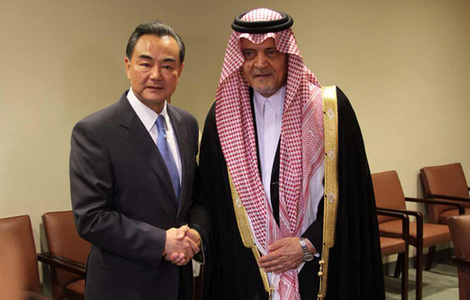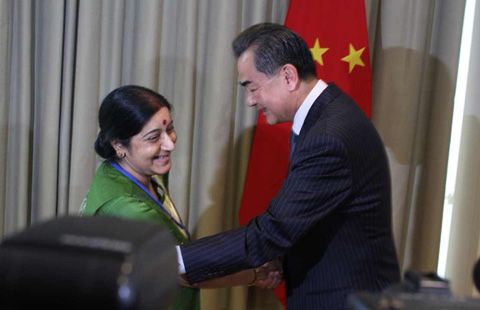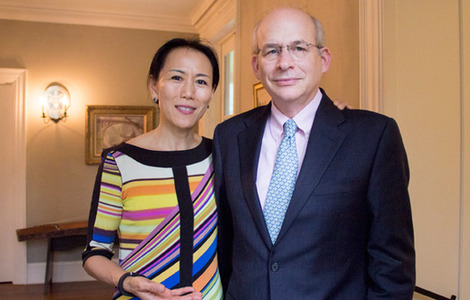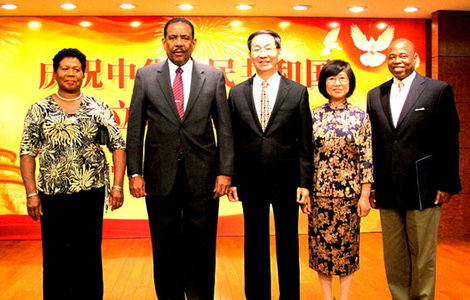Chinese donations to US universities lag behind
Updated: 2014-09-26 14:53
By Lian Zi in San Francisco(China Daily USA)
|
||||||||
Chinese students constitute more than 25 percent of foreign students at US colleges but are thought to have disproportionate college giving to US universities.
The Chinese mainland ranks eighth as a source of foreign donations to American colleges, and Hong Kong ranks No 1, reports Wall Street Journal.
The top eight countries on the list are Hong Kong, US, Canada, India, Saudi Arabia, Switzerland, United Arab Emirates, and China.
Chinese donors donated $60 million to US universities from 2007 to 2013, which accounted for 3.5 percent of total foreign donations, according to the Postsecondary Education Participation System in the US, the Journal reports.
But experts are still optimistic about the trend of college giving to US universities from the rich in China and believe that as more Chinese students graduate abroad, the attitude toward donating will change.
Unlike other regions, in China the fever to study abroad only started 30 years ago, said Leslie Yuen, CEO of the Globalization Training Office, adding that he believes that the culture of college giving will be cultivated among wealthy Chinese after two or three generations.
"Donating money, large and small sums, to American elite private colleges and universities has a long history," said Wang Ling-chi, who helped establish Asian American Studies at University of California, Berkeley and taught its first course in 1969, adding that fundraising has now become the most important role for any university president.
According to Wang, UC Berkeley now receives about 10 percent of its annual budget from the state of California. "The balance must come from grants from government and foundations and from donations from corporations, wealthy individuals, and alumni. Berkeley recently completed raising $3.31 billion from non-state sources," Wang said.
However, the donation culture has not been established well among Chinese people since most universities in China are fully supported by the central government and sometimes, provincial governments, said Wang.
As globalization continues to influence China, the country has been catching up fast with donations from corporations and wealthy individuals, but lots of donators prefer to give their cash to their hometown universities, rather than foreign ones.
For example, the infusion of money by Tan Kah Kee into many universities in Fujian made him a forerunner of Chinese philanthropy.
Recently, business tycoons from mainland China and Hong Kong have made huge contributions to top American universities.
This month, Harvard University's School of Public Health received a $350 million donation - the single largest donation by an individual to Harvard - from the family of Gerald Chan, a Harvard-educated entrepreneur from Hong Kong.
Chinese property power couple Pan Shiyi and Zhang Xinxin, founders of Soho China, announced in July they would donate a $15 million gift to Harvard.
In 2010, Zhang Lei of Hillhouse Capital Group pledged $8,888,888 to Yale School of Business, where he graduated. The money was primarily for the construction of a new campus.
As the Yale Daily News reported, Zhang said he hoped his gift to the school would serve to strengthen ties between the university and China.
Experts like Professor Wang pointed out that most of the Chinese donations to top American universities are aimed at leaving the donors' names on campus buildings in perpetuity. "But they need to make their donations more strategic and useful for promoting better understanding of China and its people," Wang said.
"They put their names on hardware, meaning, buildings, to achieve immortality," he said. "Butvery little has been given to the software, like supporting scholarships in science, social science and humanities."
If China's wealthy are interested in changing American's misunderstanding of China, they need to make donations aimed at correcting American prejudice, and increasing true understanding of Chinese history, culture, and people, which means that they should contribute to scholarships and curricular changes in Chinese studies and Overseas Chinese studies in American schools and universities, said Wang.
zilian@chinadailyusa.com
(China Daily USA 09/26/2014 page2)
Most Viewed
Editor's Picks

|

|

|

|

|

|
Today's Top News
China and US militaries work at building trust
Biz-Tech Forum in 2nd year
National Day celebrated
FM calls for action on Ebola
A warm-up for Paris meeting
Chinese donations to US lag behind
Extra points for exam over blood donation
100,000 officials were paid though they did no work
US Weekly

|

|
















